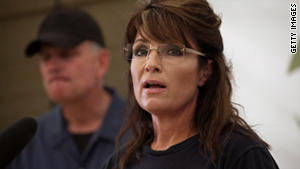OK, you've got Palin fatigue. Not to worry. So does much of the country: The latest CNN poll shows that 56 percent of Americans view her unfavorably.
More damaging, though, is this: Sarah Palin's unfavorable rating among women has gone up 10 points. And 59 percent of those all-important independent voters don't like her -- and that's up a stunning 14 points in just a few months.
You might argue it's because of the debate surrounding the Tucson shootings -- specifically, Palin's tone-deaf response to the unfair charges that she was somehow responsible for a deranged shooter's state of mind. And that could well be part of it. But there's more: She's completely overstayed her welcome.
We've watched her morph from the hockey mom into a multi-media extravaganza that knocks on our door every day to sell something, without any invitation.
When Sarah Palin was air-dropped onto the national scene, she was just what the GOP ordered. Republicans were looking for something new to cheer about. In Palin, they found it -- along with a reason to support John McCain. McCain's views on certain issues were, well, complex. Palin's were not. She was a burst of energy, a breath of fresh air, a new flame (pick your cliché) that attracted new supporters for a troubled campaign.
McCain lost, but Palin won.
Now, something is changing. Her staunch supporters are still there, to be sure, but Republicans are getting antsy, even nervous. In GOP circles, she's beginning to be seen as toxic in any presidential race. The whispers (which have always been there among the establishment) are starting to become public.
The editorial page editor of The Washington Examiner -- which defended Palin in the 2008 campaign -- opines about the "public exhaustion" with Palin. Mark Tapscott notes how Palin "has been here, there and everywhere for several months" and how "too much of a good thing becomes a bad thing when there is no escaping the good thing." Exactly.
Even the politicians, ever the lagging indicator, are starting see some benefit in chipping away at the Palin veneer. After all, there's now a sense that she's maxed out. There's nothing she can say anymore to woo new people who are not already in her corner.
So why not try and get the rest? How else to explain presidential wannabe Newt Gingrich's admonition the other day that Palin "should be more careful and think through what she's saying and how she's saying it?" This coming, of course, from a man who once compared himself to Napoleon. Or likely GOP contender Tim Pawlenty's admission that Palin's move to put cross hairs on a map of the districts of vulnerable Democrats "wouldn't have been my style"?
These men read the polls. They understand that any unfavorable rating above 50 percent is almost impossible to undo. And while they don't want to alienate Palin's supporters -- they have to win in GOP primaries, after all -- they clearly believe that criticizing Palin, even meekly, is no longer a fool's errand. "She's an enormous problem for us," says one GOP strategist. "She has a loyal following, and any time you criticize her, it convinces her followers she is more right. And you get demonized."
All of which explains the GOP tiptoeing. GOP presidential contenders may be trying to wait and see if she runs. (Why alienate her followers for no reason?) Or, they would love to see someone take her on -- like a Mike Huckabee, for instance -- with the understanding that the candidacy could become sacrificial. So who is going to sign up for that?
Not many. The hope for some Republicans is that Palin will literally tweet her way out of our hearts. The books, the reality TV, the family psycho-dramas, the never-ending internet "thought bubbles" could just be enough to drive even those who like her over the edge. And, sure, we in the press are part of this uber-coverage, behaving as if every 140-character thought is worth some conversation. It isn't. As Erick Erickson, the editor of the conservative RedState.com and a CNN contributor, told me, it's not really about what Palin has achieved. "By 2012," he says, "people are going to be so tired of her they're going to want to avoid eye contact. It's not fair, but it's reality."
And there's one more thing we can't forget: Voters actually like positive leaders who inspire them. Relentless negativity can work, to be sure. Yet in the end, Americans gravitate to those who make us feel good about who we are capable of becoming.
Successful candidacies and presidencies are not just about the foibles of the opposition. They're about our own ability -- as John McCain was fond of saying -- to become a part of something greater than ourselves. Palin, alas, is still stuck on the "me" part.
Today is the 50th anniversary of John F. Kennedy's inaugural address. Its idealistic calls for national service and civility -- combined with a dedication to human rights and commitment to the control of arms -- remain an eloquent definition of our national aspirations.
It was short, but no tweet.
The opinions expressed in this commentary are solely those of Gloria Borger.

